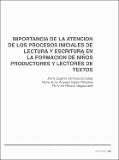| dc.contributor.author | Sánchez González, Marta Eugenia | |
| dc.contributor.author | Castro Villalobos, María de los Ángeles | |
| dc.contributor.author | Vargas León, María del Rosario | |
| dc.date.accessioned | 2020-11-10T21:44:45Z | |
| dc.date.available | 2020-11-10T21:44:45Z | |
| dc.date.issued | 1996-12 | |
| dc.identifier.issn | 2215-2997 | |
| dc.identifier.other | https://www.revistas.una.ac.cr/index.php/abra/article/view/4359/4187 | |
| dc.identifier.uri | http://hdl.handle.net/11056/18611 | |
| dc.description.abstract | Estudios realizados por investigadores
en diferentes latitudes, como los de
Emilia Ferreiro, Ana Teberosky, Aurora Leal, Yetta Goodman, nos demuestran que el niño al estar diariamente en
contacto con la escritura construye su lectoescritura. En ese proceso se plantea hipótesis, elabora
nociones en relación con ese objeto de conocimiento. Esos trabajos han constituido un significativo aporte al conocimiento y participación activa y
personal de los niños en el desarrollo de su propia
alfabetización (Goodman, 1991). Ante esto, el
maestro debe comprender que el niño al que
atiende diariamente interpreta el mundo que le
rodea según su sistema de pensamiento y que
posee un cúmulo de información que es necesario
considerar como punto de partida al iniciar los
procesos de enseñanza y aprendizaje de la lengua
escrita. | es_ES |
| dc.description.abstract | Studies conducted by researchers
in different latitudes, such as those of
Emilia Ferreiro, Ana Teberosky, Aurora Leal, Yetta Goodman, show us that the child by being daily in
contact with writing builds your literacy. In this process, he hypothesizes, elaborates
notions in relation to that object of knowledge. These works have constituted a significant contribution to the knowledge and active and
children in the development of their own
literacy (Goodman, 1991). In the face of this, the
teacher must understand that the child to whom
daily interpreting the world that he is in.
surrounds according to their system of thought and that
has a wealth of information that is necessary
consider as a starting point when starting the
teaching and learning processes of the language
written. | es_ES |
| dc.description.sponsorship | Universidad Nacional, Costa Rica | es_ES |
| dc.language.iso | spa | es_ES |
| dc.publisher | Editorial de la Universidad Nacional | es_ES |
| dc.rights | Acceso abierto | es_ES |
| dc.rights.uri | http://creativecommons.org/licenses/by-nc-sa/4.0/ | * |
| dc.source | Revista ABRA Vol. 17, No. 23-24, p. 84-90 | es_ES |
| dc.subject | APRENDIZAJE | es_ES |
| dc.subject | LEARNING | es_ES |
| dc.subject | ENSEÑANZA | es_ES |
| dc.subject | TEACHING | es_ES |
| dc.subject | NIÑOS | es_ES |
| dc.subject | CHILDREN | es_ES |
| dc.subject | ESCRITURA | es_ES |
| dc.subject | WRITING | es_ES |
| dc.subject | LECTURA | es_ES |
| dc.subject | READING | es_ES |
| dc.title | Importancia de la atención de los procesos iniciales de lectura y escritura en la formación de niños productores y lectores de textos | es_ES |
| dc.title.alternative | Importance of attention to the initial processes of reading and writing in the formation of child producers and text readers | es_ES |
| dc.type | http://purl.org/coar/resource_type/c_6501 | es_ES |
| dc.description.procedence | Escuela de Sociología | es_ES |


